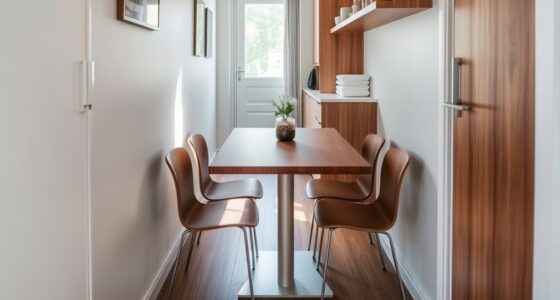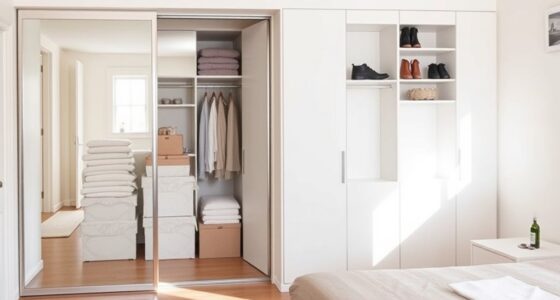Clutter directly impacts your mental health by causing sensory overload and increasing feelings of stress and overwhelm. An untidy environment can make it harder to focus, foster anxiety, and mirror inner chaos. Disorganization drains your energy and hampers productivity. The science shows that mental clutter and visual overload heighten stress levels. If you want to learn how to reduce this clutter and improve your well-being, there’s more you can do to create a calmer, clearer space.
Key Takeaways
- Clutter overloads the senses, increasing stress and making it harder to focus or feel calm.
- Emotional attachments to possessions can heighten feelings of overwhelm and frustration.
- Disorganized environments trigger anxiety, reduce mental clarity, and can lead to emotional exhaustion.
- Clearing clutter promotes a sense of control, order, and mental well-being.
- Creating a calming space with organized, minimal decor helps reduce stress and improve mood.
How Clutter Affects Our Mental State
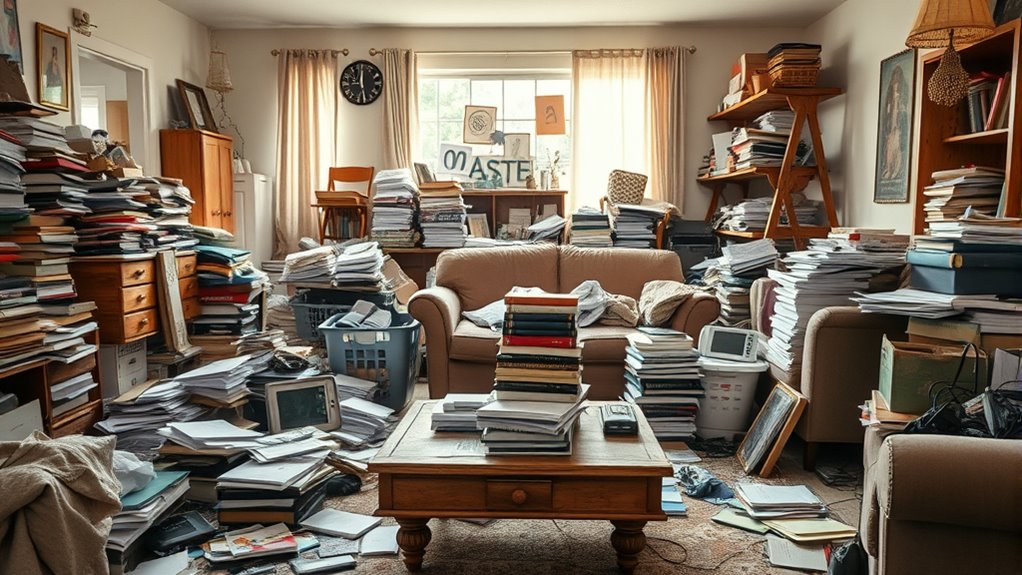
Clutter doesn’t just clutter your space—it also clutter’s your mind. When your environment is chaotic, it’s easy to feel overwhelmed and distracted. This sensory overload can make it harder to focus, process thoughts, and stay calm. Practicing digital minimalism helps reduce mental clutter caused by constant notifications and digital distractions, which only add to your stress. When your physical space is cluttered, your mind mirrors that chaos, leaving you feeling anxious or exhausted. Clearing clutter creates a sense of order, helping you regain control and mental clarity. Less visual noise means fewer interruptions and a calmer state of mind. Additionally, cultivating sustainable habits can promote a more organized and eco-friendly lifestyle, further reducing mental and physical clutter. Ultimately, simplifying your surroundings can improve your emotional well-being and make everyday tasks feel more manageable.
The Connection Between Environment and Anxiety
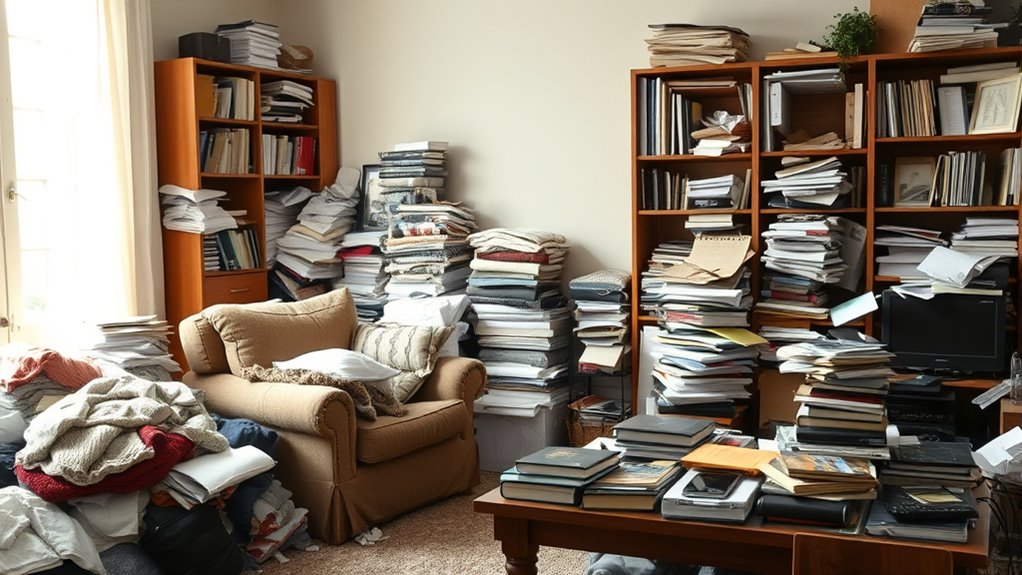
When your environment is cluttered, it can overload your senses and increase your stress levels. Disorganized spaces often lead to feelings of anxiety and overwhelm, making it hard to focus or relax. The emotional weight of clutter can also deepen feelings of frustration and helplessness. Incorporating comfort solutions like organized storage and calming decor can help mitigate these effects.
Visual Overload and Stress
Have you ever felt your mind racing simply because your surroundings are overwhelming? That’s often due to visual overload and stress caused by clutter. Bright colors and busy patterns, linked to color psychology, can heighten sensory overstimulation, making it harder to relax. Your environment’s chaos bombards your senses, increasing anxiety levels. To understand this better, consider the table below:
| Environment Aspect | Effect on Stress |
|---|---|
| Bright colors | Heightened sensory overstimulation |
| Cluttered surfaces | Visual overload |
| Excessive patterns | Distraction and fatigue |
| Unorganized spaces | Increased mental clutter |
| Lack of simplicity | Heightened anxiety |
Reducing clutter and choosing calming hues can ease sensory overstimulation, helping you feel calmer and more in control. Exploring crochet styles for locs can also serve as a calming activity that promotes relaxation and reduces mental clutter.
Disorganization and Anxiety
Disorganization in your environment can profoundly increase feelings of anxiety by creating constant visual and mental chaos. When clutter surrounds you, it’s hard to focus or relax, fueling a cycle of stress. Implementing clutter-free routines helps reduce this chaos, making your space more manageable and calming. Practicing mindful visualization can help you stay focused on organizing goals, easing feelings of overwhelm. By intentionally designing your environment, you signal to your brain that order and control are achievable, which decreases anxiety levels. Small, consistent steps—like tidying daily or setting aside time for organization—build a sense of accomplishment. As your environment becomes more streamlined, you’ll notice a reduction in anxious thoughts and a greater sense of peace. Your surroundings directly impact your mental state—choose to make them supportive. Incorporating goal setting techniques from personal development can further reinforce your commitment to maintaining an organized space and reducing stress.
Clutter’s Emotional Impact
Clutter doesn’t just clutter your space—it can also clutter your emotions, intensifying feelings of anxiety and overwhelm. When you hold onto items out of emotional attachment or sentimental clutter, it’s harder to let go, keeping unresolved feelings tied to those possessions. This physical attachment amplifies stress because each item becomes a reminder of past experiences, regrets, or unfinished business. Additionally, addressing teeth problems on a raw food diet can help reduce discomfort that might contribute to emotional distress. The more sentimental clutter you accumulate, the more your environment reflects unresolved emotions, making your space feel chaotic and emotionally heavy. This emotional burden can heighten your anxiety, creating a cycle where clutter feeds stress and stress fuels more clutter. Recognizing these emotional connections is key to decluttering and restoring mental clarity, freeing you from the weight of unnecessary possessions.
Understanding the Psychological Roots of Messiness
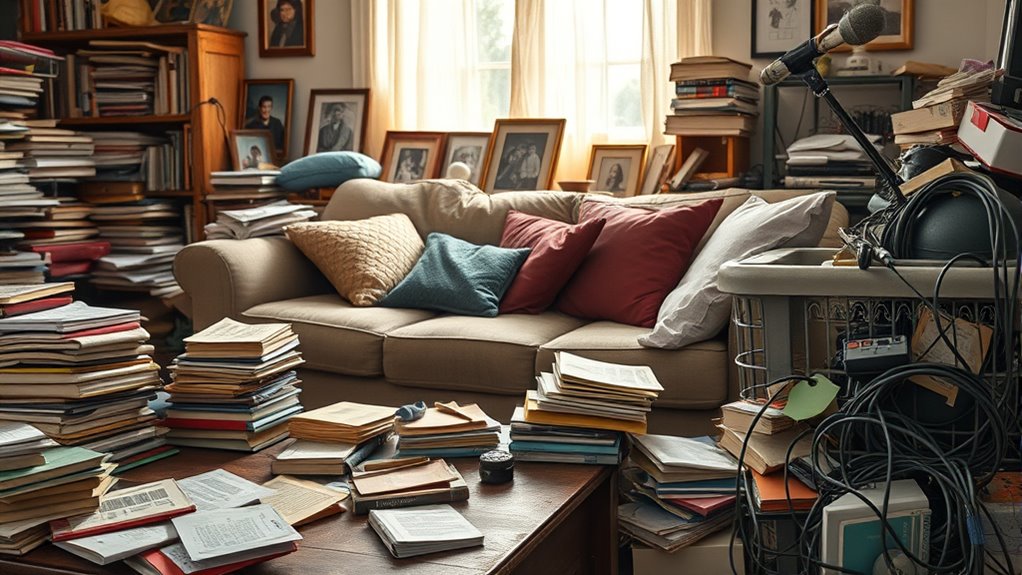
Your clutter often stems from emotional attachments to certain items, making it hard to let go. Anxiety and feelings of overwhelm can also lead you to cling to familiar messes rather than face change. Additionally, habitual organization patterns shape how you manage your space, reinforcing your cluttered habits. Understanding how visual clutter impacts your mental state can help motivate you to develop better organization strategies.
Emotional Attachments to Items
Many people hold onto certain items because they serve as tangible reminders of meaningful moments, relationships, or achievements. These sentimental items create strong emotional attachments, making it difficult to let go. Your attachment often isn’t about the object itself, but what it represents—love, success, or a special memory. These emotional ties can lead to clutter building up over time. For example, aquatic exercise can be a soothing activity that helps you release stress associated with clutter by promoting relaxation and mental clarity. While these items bring comfort and nostalgia, they can also contribute to stress if their emotional significance prevents you from decluttering. Recognizing these attachments helps you understand why letting go feels so challenging.
Anxiety and Overwhelm
Emotional attachments to keepsakes can make it harder to face the chaos of clutter, but underlying feelings like anxiety and overwhelm often drive the messiness even deeper. When you feel overwhelmed, clutter can seem like an insurmountable obstacle, increasing your stress rather than easing it. Clutter psychology reveals that your environment reflects your mental state, creating a cycle of tension. Practicing mindful decluttering helps you recognize anxiety triggers and approach clutter with compassion instead of judgment. By breaking tasks into small, manageable steps, you can reduce feelings of overwhelm and regain control. Understanding that your mess might be a response to emotional distress allows you to address the root causes, easing anxiety and creating a calmer, more organized space. Awareness of electric bikes and their features can also inspire alternative ways to incorporate movement and reduce stress in your daily routine.
Habitual Organization Patterns
Habitual organization patterns are deeply rooted in our psychological makeup, shaping how you manage and maintain your spaces over time. Your habitual routines influence whether clutter accumulates or gets sorted, often without you realizing it. These routines are shaped by past experiences, habits, and comfort zones. Clutter triggers—like stress, fatigue, or distraction—can disrupt your usual organization, making messiness more likely. Recognizing these patterns helps you understand why clutter persists despite your efforts. By consciously adjusting your routines and minimizing triggers, you can develop healthier habits. Small changes, like setting designated spots for items or creating quick tidy-up rituals, reinforce positive behaviors and reduce clutter buildup over time. Understanding your habitual patterns is the first step toward creating a more organized, stress-free space. Incorporating sound design techniques such as ambient cues or calming auditory signals can also support your efforts to maintain order and reduce stress.
Clutter as a Reflection of Inner Chaos

When your surroundings are cluttered, it often mirrors the chaos brewing inside your mind. The mess you see might reflect emotional baggage you’ve carried for years, unresolved feelings that weigh you down. Childhood memories, whether joyful or painful, can influence how you manage your space today. If you grew up in a cluttered environment, you might associate mess with comfort or neglect, shaping your current habits. Conversely, clutter can symbolize feelings of overwhelm or insecurity, serving as a physical manifestation of inner turmoil. Recognizing this connection helps you understand that your clutter isn’t just about organization—it’s a window into your emotional state. Addressing these underlying issues can make it easier to create a space that feels calm and balanced. Embracing creative practice can also provide a healthy outlet for expressing and processing your emotions, leading to a more orderly and peaceful environment.
The Impact of Disorganization on Productivity
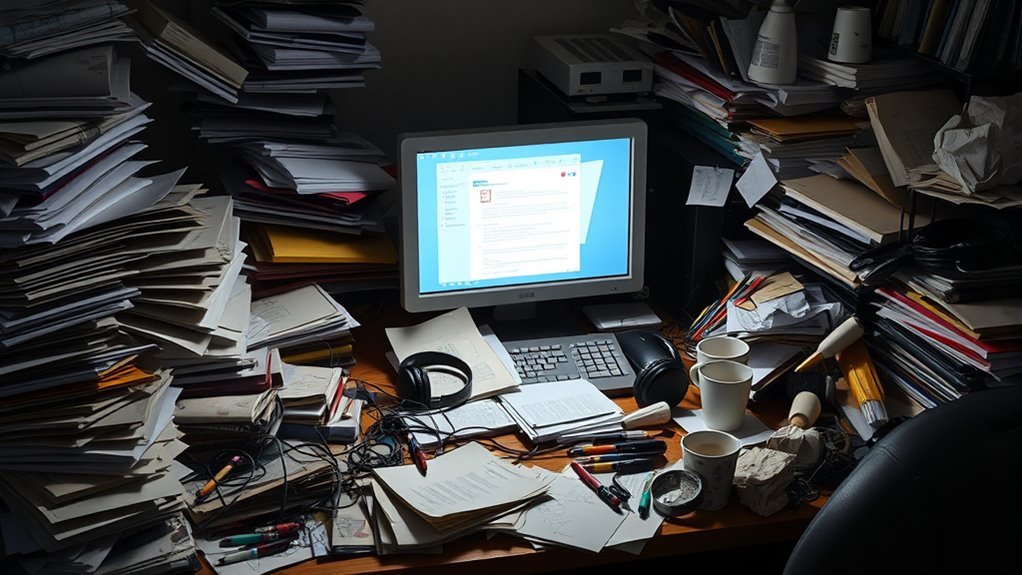
When your workspace is cluttered, it becomes harder to concentrate and stay focused on tasks. Disorganization forces you to spend more time searching for things, which drains your mental energy. As a result, decision fatigue sets in, making it tougher to prioritize and complete work efficiently.
Reduced Focus and Concentration
Have you ever noticed how a cluttered desk can make it hard to focus? Disorganization can markedly reduce your ability to concentrate, as visual chaos constantly distracts your mind. This overload of stimuli can lead to sensory overload, making it harder to complete tasks efficiently. To regain focus, consider a digital detox to minimize digital distractions. Clearing physical clutter helps create a calmer environment, allowing your brain to process information more effectively. Without clutter, your mind can better prioritize tasks and stay attentive. Remember, a tidy space isn’t just about aesthetics; it directly impacts your productivity. Reducing visual noise frees up mental space, making it easier to stay engaged and sharp. A clean environment supports your focus and enhances overall performance.
Increased Decision Fatigue
Disorganization can considerably increase decision fatigue, draining your mental energy with every choice you face. When your space is cluttered, even simple decisions—like picking an outfit or finding your keys—become more taxing. This mental clutter hampers your focus and saps your productivity. To combat this, practicing digital minimalism can help reduce digital distractions that contribute to decision overload. A clutter detox, which involves clearing physical and digital clutter, streamlines your environment and simplifies choices. By reducing unnecessary options and organizing your space, you conserve mental resources, making decision-making easier and less exhausting. Ultimately, less clutter means less decision fatigue, enabling you to stay focused and energized for the tasks that truly matter.
Why a Tidy Space Boosts Our Mood

A tidy space can considerably boost your mood because it creates a sense of order and control in your environment. When you practice mindful decluttering, you actively remove unnecessary items, making space for what truly matters. This process enhances your ability to focus and feel more relaxed. Space optimization ensures your environment feels open and inviting, reducing feelings of overwhelm. A clean environment also encourages positive habits and boosts your confidence.
- Reduces mental distractions and promotes clarity
- Enhances your sense of accomplishment and well-being
- Supports a calmer, more focused mindset
The Science Behind Visual Overload and Stress

When your visual environment is cluttered, your brain works harder to process the excess stimuli, leading to increased stress levels. This overload affects your visual perception, making it harder to focus and interpret what’s around you. As your brain tries to filter out unnecessary details, your cognitive load rises, requiring more mental effort. This heightened effort can cause feelings of overwhelm and fatigue, reducing your ability to concentrate and make decisions. Clutter overload disrupts the brain’s natural efficiency, triggering stress responses even if you don’t realize it. The more visual stimuli competing for your attention, the harder your brain has to work, which intensifies feelings of anxiety and mental exhaustion. Keeping your space organized helps reduce this cognitive load, promoting calmness and clarity.
Strategies to Reduce Clutter and Improve Well-being

Reducing clutter can substantially lower your mental load and boost your overall well-being. Start by decluttering decorative clutter that no longer brings joy or purpose. Use effective storage solutions like bins, shelves, or drawer organizers to keep essentials out of sight but accessible. Address clutter hotspots, such as countertops or desks, to create a calmer environment. Implement a regular tidying routine to prevent buildup and maintain order. Consider donating items you no longer need to reduce visual noise. Keeping surfaces clear and organized helps your mind relax and focus. Remember, small consistent efforts yield lasting benefits. Simplifying your space not only improves aesthetics but also reduces stress, making your environment more inviting and supportive of your mental health.
The Role of Mindset in Maintaining an Organized Space
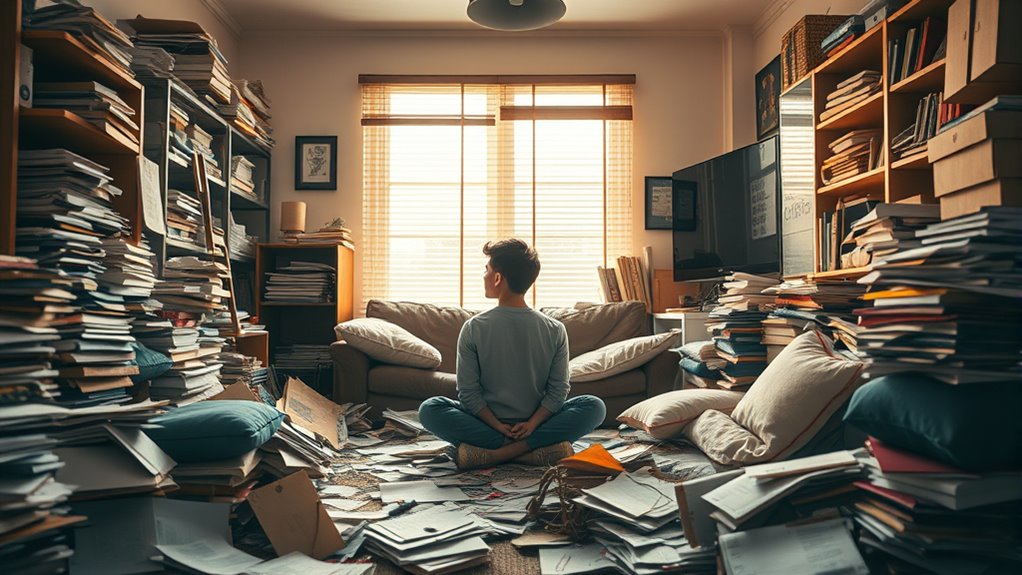
Your mindset plays a crucial role in maintaining an organized space because it shapes your attitudes and habits around clutter. A mindset shift helps you view tidiness as achievable rather than overwhelming. By embracing positive beliefs, you reinforce habit formation that sustains order. Focus on progress, not perfection, to make consistent changes easier.
| Mindset Element | Impact on Organization |
|---|---|
| Growth Mindset | Encourages learning from setbacks |
| Consistency | Reinforces daily habits |
| Self-belief | Boosts motivation to stay organized |
With intentional effort, your mindset transforms your environment. Recognizing that small, consistent actions lead to lasting change makes maintaining an organized space less intimidating and more attainable.
Transforming Your Environment for Better Mental Health
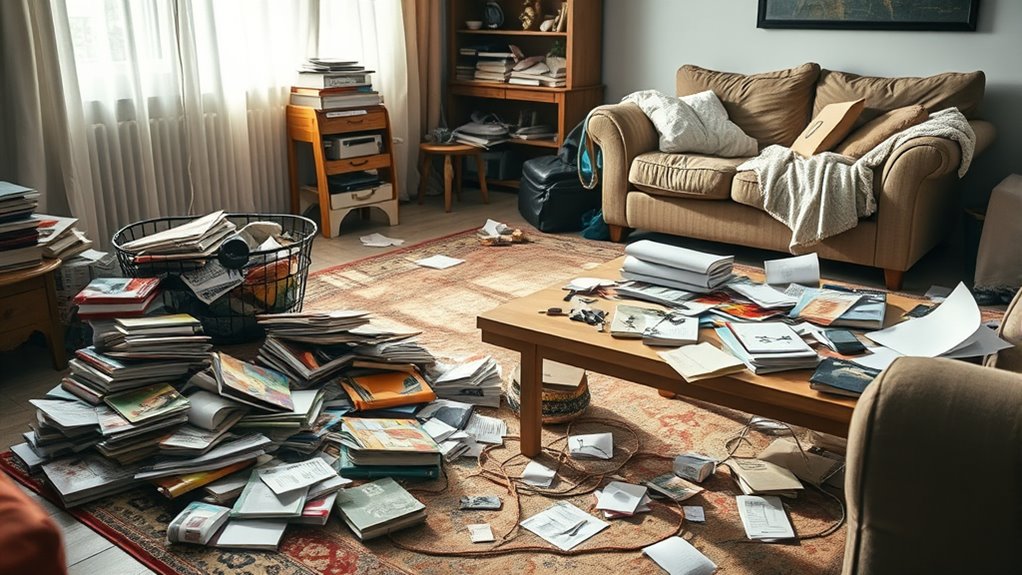
Transforming your environment can substantially boost your mental health by creating a space that supports relaxation, focus, and emotional well-being. Applying feng shui principles helps you arrange your space to promote positive energy flow, reducing stress and enhancing clarity. Using color psychology, you can select calming hues like blues and greens to foster tranquility or energizing shades like yellows to boost happiness. Decluttering your space and organizing belongings create a sense of control, further reducing anxiety. Consider these strategies to optimize your environment:
- Incorporate feng shui principles to enhance harmony
- Choose colors aligned with your mood goals
- Maintain a clutter-free space for mental clarity
These adjustments can make your environment work for your mental health, encouraging a calmer, more focused mindset.
Frequently Asked Questions
Can Clutter Cause Long-Term Mental Health Issues?
Clutter can indeed lead to long-term mental health issues. When you’re surrounded by mess, emotional attachment to items can make it hard to let go, increasing stress. Over time, this chaos can cause decision fatigue, leaving you exhausted and overwhelmed. Persistent clutter may contribute to anxiety or depression. Clearing your space helps reduce emotional burden, promotes clarity, and supports better mental health by creating a calmer environment.
How Does Clutter Influence Sleep Quality?
Clutter accumulation can markedly disrupt your sleep quality by causing sleep disruption and making your bedroom feel chaotic. When your space is cluttered, your mind struggles to relax, leading to difficulty falling asleep or staying asleep. The visual chaos can increase stress levels, making it harder to unwind at night. To improve sleep, keep your environment tidy, minimizing clutter and creating a peaceful space that promotes restful sleep.
Are There Specific Personality Types More Prone to Messiness?
Certain personality traits, like high impulsivity or low organization skills, make you more prone to messiness. Environmental factors, such as limited space or chaotic routines, also influence how clutter accumulates. If you tend to be spontaneous or struggle with time management, you’re more likely to overlook tidiness. Recognizing these traits and factors helps you develop strategies to manage clutter better, ultimately reducing stress and creating a more calming environment.
What Role Does Childhood Upbringing Play in Adult Clutter Habits?
They say, “You are what you repeatedly do.” Your childhood habits and upbringing influence your clutter habits today. If you grew up in a tidy environment, you’re more likely to keep things organized. Conversely, a chaotic upbringing may lead to clutter accumulation. Your early experiences shape how you handle mess, making your upbringing influence your adult clutter habits. Understanding this connection helps you break free from clutter patterns.
Can Decluttering Therapy Improve Anxiety and Depression?
Decluttering therapy can markedly improve anxiety and depression by encouraging mindful organization and emotional release. When you actively sort through your belongings, you gain control over your environment, which helps reduce stress. This process fosters self-awareness and allows you to process underlying feelings. As you create a more organized space, you’ll likely notice a boost in your mood and a sense of calm, making it easier to manage emotional challenges.
Conclusion
You might think decluttering takes too much time, but the mental clarity you’ll gain is worth it. Clearing your space reduces stress and boosts focus, making daily life smoother. Even if your mess feels overwhelming, start small—you’ll soon notice a calmer mind and a more productive environment. Remember, creating an organized space isn’t about perfection; it’s about giving yourself the mental space you deserve. So, take that first step—you’re worth it.


